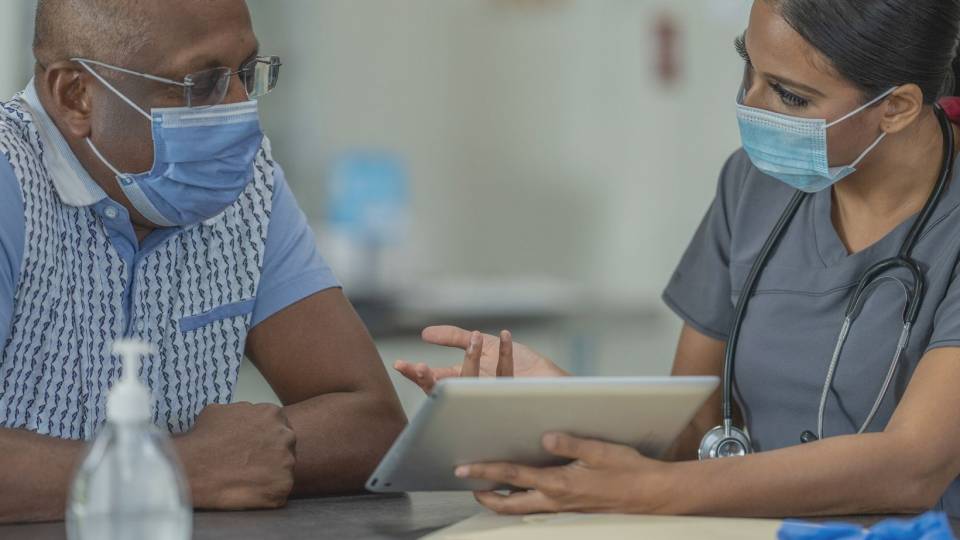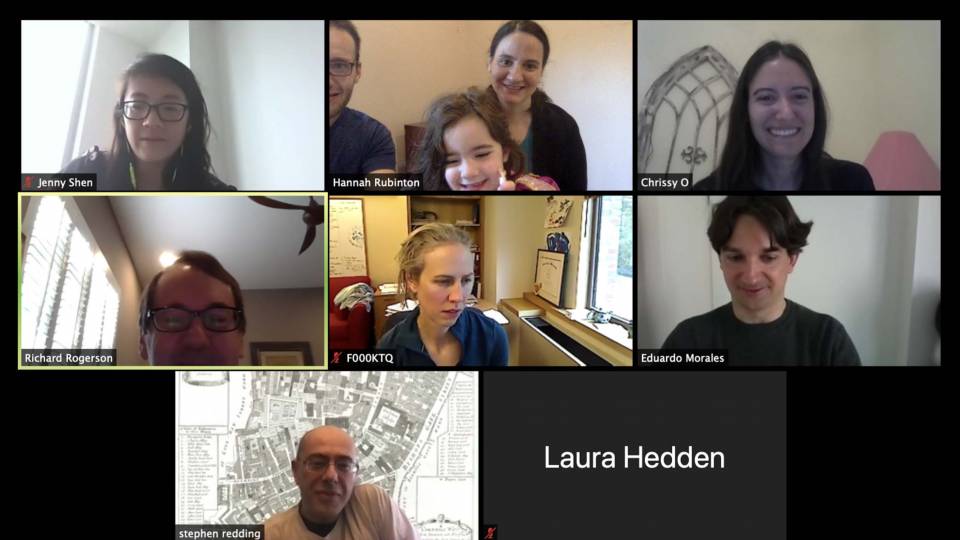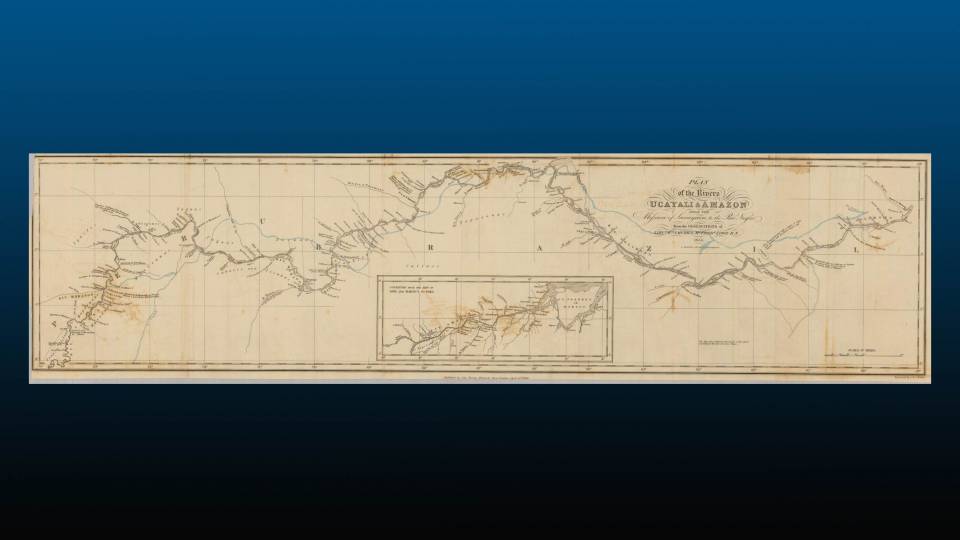When the pandemic dashed dreams of traditional summer internships, the University helped students pivot to internships that are 100% digital. These opportunities span academic disciplines; others include a service component. Pictured: Anupama Pattabiraman, a 2010 alumna, founded the nonprofit Support Forest Hills Eateries at the start of the pandemic to help her local community and reached out to the University to find Princeton student-interns.
In a typical summer, thousands of Princeton students are scattered across the country and around the globe for internships that enrich their academic focus, provide valuable work experience, jumpstart their professional network and expand their worldview.
The pandemic changed all that, taking in-person internships off the table.
Enter the virtual internship. This summer, the University helped students pivot from their original plans to a wide variety of internships that are 100% digital. These opportunities span academic disciplines. Others include a service component, reflecting the University’s informal motto, “In the nation’s service and the service of humanity.” Some are focused on issues related to racial and social justice, and helping those affected by the pandemic, through the Pace Center for Civic Engagement’s RISE fellows and COVID-19 Response Grant programs.
Princeton’s vast alumni network also jumped in. Anupama Pattabiraman, a 2010 alumna, founded the community initiative Support Forest Hills Eateries at the start of the pandemic to help her local community. She reached out to Princeton's Center for Career Development to find interns who could work remotely this summer. Victoria Agwam — a member of the Class of 2023, Service Focus student and Pace Center COVID-19 Response Grant recipient — was one of the first students to respond.
“Victoria was inspired to help eateries that she had visited growing up nearby,” said Pattabiraman, a member of Princeton AlumniCorps — a network of alumni volunteers whose mission is to mobilize people, organizations and networks for the public good. “I admire her dedication and thoughtful approach to all of her work, whether she is refining our logo design, generating social media content or finding ways to support Black-owned businesses.”
Grant Wythoff, a 2013 graduate alumnus and digital humanities strategist in Princeton’s Center for Digital Humanities, is supervising Tejas Gupta, a member of the Class of 2024, in an internship with Philly Community Wireless Project, which delivers internet to communities in need in Philadelphia.
“At the beginning of this project, we looked for ways that the tools and techniques of digital humanities research could serve the communities we live in during the pandemic,” Wythoff said. “In the process, we partnered with community technology organizations who taught us to see the digital humanities in a new light. Tejas has leapt into both conversations.”
Below are reflections from six students on their remote internship experiences.
Victoria Agwam, Class of 2023

Victoria Agwam, a member of the Class of 2023, is leading marketing efforts at the nonprofit Support Forest Hills Eateries (SFHE), including redesigning the website, overseeing social media, producing weekly newsletters and creating SFHE's logo — inspired by Forest Hills architecture.
Concentration: Economics
Hometown: Jamaica, Queens, New York City
What kind of virtual work are you doing?
I am working with Support Forest Hills Eateries (SFHE) to support local eateries and community members through COVID-19. I lead marketing efforts to develop a centralized online community for business owners and residents using social media and the SFHE website. I also had the pleasure of creating SFHE's logo (inspired by Forest Hills architecture), redesigning the website and producing weekly newsletters to send out to the community.
Why were you interested in this particular internship?
In high school, I always looked forward to exploring the streets of nearby Forest Hills with my friends. As I began to realize how emblematic the neighborhood is of New York City’s racial economic inequalities, I wanted to focus my attention there. Sharing information to the community about the disproportionate impacts of COVID-19 on ethnic and racial minority communities, and the dearth of Black residents and business owners in FH was important to me. Sarah Schneider, a 2019 alumnus and my Service Focus mentor, helped me polish and improve my skillsets. I hope to learn more about advocacy, public policy and building service-oriented skills through Service Focus.
What has been a highlight of your experience?
I interviewed the owners of the only two Black-owned businesses in FH and wrote a story for the SFHE website. The fact that there are only two was shocking yet unsurprising given the racial economic inequalities in NYC (despite Blacks accounting for 22% of NYC's population, only 2% of NYC business owners are Black — sad!).
After interviewing Tina Sinclair (The Wine Room of Forest Hills) and Anthony Oll-adikankwu Jr. (Misfits Nutrition), my spark for service was ignited because it reminded me how much work needs to be done in New York, and in the nation, to dismantle structural barriers that inhibit persons of color from accessing upward economic mobility and entrepreneurial success. My motivation for concentrating on economics was also ignited; while the underrepresentation of people like me within the field is unsettling, it is vital to me that people who are affected the most by economic inequalities have a say in economic-policy decisions.
Noelia Carbajal, Class of 2022

This summer, Noelia Carbajal, a member of the Class of 2022, is immersed in "digital archaeology." As an intern for the Butler Archive Project in the Visual Resources Collection in the Department of Art and Archaeology, her work entails deciphering and transcribing handwritten entries from the expedition diaries of Howard Crosby Butler, an American archaeologist, and 1892 alumnus who joined Princeton’s faculty in 1895 and organized his first expedition to Syria in 1899.
Concentration: Classics; pursuing certificates in art and archaeology, and medieval studies
Hometown: The Bronx, New York City
What kind of virtual work are you doing?
I am interning at the Butler Archive Project along with Isabella Impalli [a member of the Class of 2022], under the guidance of Julia Gearhart, director of the Visual Resources Collection in the Department of Art and Archaeology. My work entails deciphering and transcribing handwritten entries from the expedition diaries of Howard Crosby Butler, an American archaeologist, and 1892 alumnus who joined Princeton’s faculty in 1895. He organized his first expedition to Syria in 1899.
After transcription, it’s easy for me to get to the crux of my work, which is to verify place-names and specific archaeological sites that Butler mentions in his travel notes. I do this by consulting other journals in the Butler Archive, doing outside research, and using mapping software such as Pleiades and Recogito. The goal is to create a digital map outlining Butler’s expedition.
Why were you interested in this particular internship?
I hadn't heard of "digital archaeology" before. I thought you could only experience archaeology at a field school, like the one I went to last year with Professor Caroline Cheung [assistant professor of classics] — an excavation site called Cosa, an ancient Latin colony, in Italy. Also, my course load has focused mostly on ancient Rome and Greece and not places like Syria, Jordan and Turkey, where some of the earliest Christian churches can be found. This internship was the perfect opportunity for me to gain practical experience in a different kind of archaeology and learn about a different part of the world. It also fulfills the fieldwork requirement towards my art and archaeology certificate.
What has been a highlight of your experience?
One highlight has been growing increasingly comfortable with reading Butler's handwriting. When people think of archaeology, they think of Indiana Jones searching for the Lost Ark — they think of dirt, dangerous sites and freshly unearthed artifacts. But as I've come to learn, a piece of writing is an archaeological endeavor of its own. You have to navigate messy penmanship and misleading orthography, and if you're trying to produce a digital map, you also get to travel through the depths of Google in search of coordinates for different place-names!
Gabriel Duguay, Class of 2022

Gabriel Duguay, a member of the Class of 2022, says his internship with the Fisheries sector of the Assembly of First Nations, a national advocacy group for the Chiefs of 636 First Nations in Canada, "inspires me because it combines my passion for combating food insecurity, environmental justice and empowering Indigenous communities." A native of Canada, Duguay is of Mi'kmaq and Settler descent.
Concentration: Independent concentration in Indigenous studies; pursuing certificates in humanistic studies, environmental studies and the history of practice of diplomacy
Hometown: Truro, Nova Scotia
What kind of virtual work are you doing?
My internship is with the Fisheries sector of the Assembly of First Nations (AFN), a national advocacy group for the Chiefs of 636 First Nations in Canada. First Nations are the Canadian equivalent to American Indian Tribes or Nations. The mandate for the AFN comes from resolutions passed by all-Chiefs Assemblies and include advocacy, research and analysis of all activities that impact the lives of First Nations peoples including governance, fisheries and natural resources. My job is to support the Fisheries team by providing analysis and academic research related to Indigenous aquaculture governance, Supreme Court Rights implementation and inland fisheries.
Why were you interested in this particular internship?
I am of Mi'kmaq and Settler descent. My internship inspires me because it combines my passion for combating food insecurity, environmental justice and empowering Indigenous communities. It also builds upon my work as founder of the Indigeneity at Princeton Task Force, which works with the Office of Admission, Office of Diversity and Inclusion, Carl A. Fields Center, Office of the Dean of the College and an alumni group led by Yolandra Toya, M.D., a 1988 alumna, to increase Indigenous representation on campus.
What has been a highlight of your experience?
The highlights have definitely been working at a high level on complex policy issues and working with the Fisheries team. Being able to apply research I've previously done at Princeton and in high school on Supreme Court of Canada decisions surrounding First Nations Rights to advise First Nations chiefs is truly an honor. Moreover, I am lucky to have incredibly well-informed, supportive and inspiring colleagues who have made my internship a strong learning experience.
My hope is that my work will contribute to work being done by the Assembly of First Nations to ensure that First Nations can access rights guaranteed to them by the Supreme Court of Canada, but which haven't been fully implemented by the Government of Canada. The implementation of these rights will improve the quality of life of First Nations from coast to coast, and is an important step in achieving reconciliation between First Nations and Canada.
Tejas Gupta, Class of 2024

Tejas Gupta, a member of the Class of 2024, is interning at the Philly Community Wireless Project through Princeton’s Center for Digital Humanities and the Pace Center’s RISE initiative. The nonprofit helps deliver internet to communities in need in Philadelphia. Pictured: A data visualization of the digital divide of broadband connectivity and race in Philadelphia.
Concentration: Undeclared
Hometown: Short Hills, New Jersey
What kind of virtual work are you doing?
I am interning at the Philly Community Wireless Project (PCWP) through Princeton’s Center for Digital Humanities and the Pace Center’s RISE initiative. I help deliver internet to communities in need in Philadelphia. I am working to identify in-need communities using data analysis, create the project’s website and social media channels, look for further funding opportunities, and work on the technical aspects of network infrastructure.
Why were you interested in this particular internship?
This internship called out to me as it combines both fighting for racial justice and incorporating my tech engineering background. I am intending to concentrate in a B.S.E. in computer science and pursue certificates in South Asian studies (as I recently returned from Bridge Year India) and urban studies (as my service projects usually focus on sustainable urban systems). The PCWP was formed in response to COVID-19 worsening the digital divide. While I can’t help develop a vaccine or teach a classroom full of students, I can help minority communities get online at time when doctors’ offices and classrooms are accessed over the internet.
What has been highlight of your experience?
The highlight of my experience has definitely been the opportunity to learn from and contribute in our national community wireless meetings. I am the youngest person in the meetings and directly bouncing off ideas with industry experts who have been working in community building and networking longer than I have been alive is very empowering. The generational passing down of information is truly very rewarding.
Jimin Kang, Class of 2021

Jimin Kang, a member of the Class of 2021, has been interning for the New York City-based Narratively — which is focused on human interest, long-form online journalism — from her home in Seoul, South Korea. She has fact-checked stories on topics ranging from Black women homesteaders to wacky, music-loving dictators (pictured); worked with social media; done layout for several stories; read essay submissions; and worked on her own projects.
Concentration: Spanish and Portuguese; pursuing certificates in journalism, Latin American studies, environmental studies and creative writing
Hometown: Seoul, South Korea
What kind of virtual work are you doing?
Since late May, I've been working as an editorial intern at Narratively, a multimedia company based in New York dedicated to, in their words, "celebrating humanity through authentic storytelling." I've fact-checked stories on topics ranging from Black women homesteaders to wacky, music-loving dictators; worked with social media; done layout for several stories; read essay submissions; and, most excitingly, gotten to work on my own projects. One is an essay about how a giant cartoon penguin stole the hearts of millennials across South Korea, and the other is a Q&A with an artist who spent two decades lugging around life-sized mannequins for a photo project on marriage as a social construct.
Why were you interested in this particular internship?
I've been doing hard news journalism with the University Press Club since my first year at Princeton, when I began seriously considering a career in the field. But in recent semesters, as I've developed more creative styles of communication through classes on creative non-fiction, poetry, translation and documentary filmmaking, I've felt a calling towards human-interest stories that are communicated less on a breaking-news basis and more in long-form, multifaceted narratives. I thought working with Narratively would be the perfect chance for me to bridge my love for factual, non-fiction storytelling with my appreciation for creative flair.
What has been a highlight about your experience?
My highlight is getting to engage with some of the wackiest stories I've ever encountered. My latest fact-checking project involved a 10,000-word piece about a detective with hooks for hands, who solved a murder case that took place across two countries. The story left my head spinning for hours. I've also enjoyed being on the backend of Submittable (the submission platform Narratively uses) and reading stories from people all over the world on topics ranging from COVID-19 to the One Direction fandom. There's no shortage of great stories to tell in the world, and it's really heartening to be reminded of that in a time when it feels like we're encountering the same narratives every day in the media cycle.
Margaret Lynch, Class of 2021

Margaret Lynch — one of more than 100 Princeton students for whom Princeton Environmental Institute helped arrange digital internships — is working with the Sigman Lab to better understand ancient climate and environmental conditions. Working from home, Lynch was provided with a stage microscope and equipment for preparing zooplankton samples from the Southern Ocean.
Concentration: Geosciences
Hometown: Fort Washington, Pennsylvania
What kind of virtual work are you doing?
The Sigman Lab, led by Daniel Sigman [the Dusenbury Professor of Geological and Geophysical Sciences, and professor of geosciences], studies the cycling of elements in marine environments in order to better understand the climate and environmental conditions throughout Earth’s history. This summer, I am preparing Southern Ocean foraminifera samples for both d18O and d15N isotopic analysis. By studying these zooplankton through these two analytical techniques, we can reconstruct nutrient consumption and environmental conditions in the Atlantic Sector of the Southern Ocean, which will contribute to the Sigman Lab’s paleoclimate research.
Why were you interested in this particular internship?
I became interested in biogeochemistry and paleoclimate studies through my undergraduate geosciences coursework, and I directly engaged with biogeochemistry and stable isotope research through a Princeton Environmental Institute internship in the Sigman Lab in summer 2019. I continued research in the Sigman Lab for two junior independent research projects, and I was excited for another PEI internship opportunity in the Sigman Lab this summer to continue uncovering the story of the Atlantic Sector of the Southern Ocean. This upcoming year, I am eager to pursue related research for my senior thesis to better understand the mechanisms that control Earth’s climate.
What has been a highlight about your experience so far?
I have primarily studied diatoms, a phytoplankton, in the Southern Ocean during my junior independent research and 2019 PEI internship, so it has been interesting to learn about and work with a new marine organism. Additionally, I have valued weekly virtual meetings with my mentors where we discuss papers and studies related to Southern Ocean paleoclimate research.
Although working remotely has limited my ability to perform hands-on research, the virtual nature of my PEI Internship has given me the opportunity to dive deeper into the theoretical elements of my research. Through analyzing and discussing new and old studies in the field I have been able to deepen my understanding of the internship research project away from the lab. While I found remotely learning new species identification methods and microscopy techniques challenging, the Sigman Lab was very helpful in providing me with the materials and information necessary to succeed.















